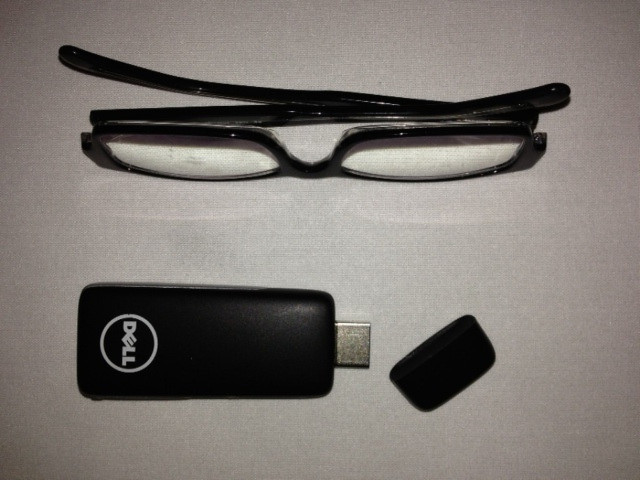Ophelia: This USB-Size Cloud Computer From Dell Is A Total Game Changer

Dell may have found a way to reinvent itself: The Round Rock, Texas, company is considering going private after 24 years on the Nasdaq, but even if a deal isn’t struck, there’s one particular project in development that may completely change Dell’s outlook and make it a true contender in this post-PC era.
I know what you’re thinking. “Dell? Making a Post-PC contender? But Dell makes PCs. Why would Dell kill off its own business?” One word: reinvention.
Dell might just enjoy another renaissance if all goes well with its project codenamed Ophelia, a USB-size self-contained computer, which can provide access to virtually every major operating system there is -- from the Mac OS to Windows to Google’s Chrome OS to cloud-based solutions from Citrix and Dell -- all via the cloud.
Ophelia works exactly like a USB port: Just plug it into any flat panel monitor or TV, and, boom, you have a computer. Ophelia automatically connects to the Internet via Wi-Fi and can link to keyboards and other peripherals via Bluetooth.
According to Quartz, Ophelia is powered by Google’s Android operating system to handle local tasks such as decoding and encoding audio and video, but the computer itself is relatively power-friendly. The Ophelia reportedly draws 2.1 watts of power; comparatively, the average smartphone microprocessor draws a little more than 1 watt, while the average PC can consume more than 20 times as much electricity.
Ophelia is so electricity-savvy, because most of its tasks are offloaded to servers in the cloud, and even though the device resembles nothing like a computer, it essentially provides the exact same experience -- as long as you can connect to the Internet.
Why Ophelia Is A Game Changer
Like Apple’s iDevices such as the iPhone and iPad, Dell’s Ophelia is a computer -- a PC -- and yet, it’s everything it’s not.
PCs are cumbersome, heavy and slow. Ophelia provides a computer experience as typical and fast as any other computer -- again, everything depends on the Internet connection -- but at a fraction of the weight. PCs can’t fit in your pocket; Ophelia can. Heck, you could probably stick anywhere between two to five of those computers into a normal pants pocket.
Ophelia is a game changer for consumers, but it could be an even bigger boon for Dell.
Dell, which has been dogged over the past decade by struggling sales and angry investors, might actually get a reprieve from Ophelia. After being a hugely successful PC maker, the innovator of the customized, direct sales computer, Dell took a wrong turn when it outsourced its manufacturing. Consequently, the company may actually be turning back to its self-reliant roots by developing an entirely cloud-based solution like Ophelia that requires very little assembling. Furthermore, most of Dell’s cloud-based customers currently consist of federal and local governments: Ophelia potentially makes sense for them, too, because it will be cheap, powerful, portable and flexible.
Dell plans to sell Ophelia at an extremely low price point, hoping to appeal to individual as well as corporate customers.
“We want to start the product at $50,” Tarkan Maner, Dell’s VP of cloud operations, said in an interview with Quartz. “And I’m still making 50 percent gross margin!”
Dell Moves Forward
Dell is being forward-thinking for the first time in a long period, and it’s clearly learned from what Google does so well: Sell cloud-based products and services to remove most of the manufacturing costs, and make money from subscriptions for storage, security or other services.
Dell may or may not go private after more than a decade on the stock market, but whatever the company opts to do, Ophelia will certainly provide useful leverage.
Ophelia, which emerged from the acquisition of cloud solutions company Wyse Technology last April, adds to Dell's value. For a start up Wyse generated substantial revenue even before its acquisition by Dell: In 2011, Wyse had about $400 million in sales, with $250 million of that money coming in the final quarter of that year. Dell’s VP Maner believes Wyse would be a billion-dollar company if it were still independent.
The growth of Dell’s cloud-based services, which may in time eclipse the company’s failing PC sales, might be the turning point in the decision to take Dell private.
Dell’s $50 billion business may have been hemorrhaging recently, but a leveraged buyout wouldn’t necessarily mean Dell would have to strip itself completely. Unlike IBM, Dell doesn’t need to sell off its PC business; it only needs to shed the parts that aren’t “complete systems,” saving the data centers and individual workstations.
But it all depends on Ophelia. If Dell can truly make a name for itself with cloud-based computing, the company can refocus on more specific services and pivot toward fewer clients. If Dell wants to reinvent itself in the post-PC world, Ophelia may indeed be the key.
© Copyright IBTimes 2024. All rights reserved.






















